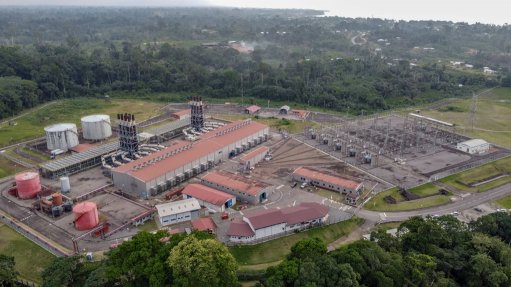
The 216 MW Kribi gas-fired power plant in Cameroon.
Technology group Wärtsilä has been commissioned to upgrade the electrical and automation systems to increase the reliability of the 216 MW Kribi power plant in Cameroon.
The order with Wärtsilä was placed by Kribi power development company (KPDC) – a subsidiary of Globeleq, an independent power producer and the owner and operator of power generating facilities across Africa.
The order will be booked in Wärtsilä’s order intake in the third quarter and the company will also support the customer’s operational and maintenance performance with a ten-year long-term service agreement. The long-term service agreement includes remote operational support, maintenance planning, technical advisory and remote troubleshooting services, as well as spare parts.
The project is scheduled to start in 2023 and will be carried out on one engine a time to ensure the continuity of the plant's output.
The plant – which at the time of commissioning was the largest powered by gas engines in sub-Saharan Africa – has been in operation for nearly ten years, operating with 13 Wärtsilä 50DF dual-fuel engines that are running primarily on natural gas.
Globeleq CEO Gionata Visconti says the Kribi power plant has a vital role within the African energy sector. “It is still today supplying two-thirds of the thermal energy in Cameroon.”
Cameroon’s energy system relies heavily on hydropower, but has uncertain resources of water. “The Kribi plant, therefore, plays a key role in ensuring a supply of safe, cheap and reliable energy,” he says.
For this reason, Globeleq wants to upgrade the power plant’s automation systems to the latest design to increase reliability and to strengthen its cooperation with Wärtsilä, leveraging its competencies on a continuous basis within the framework of the long-term service agreement, says Visconti.
Wärtsilä energy services VP Markus Ljungkvist says Wärtsilä has a strong regional presence, enabling the company to provide valuable technical support that enhances engine performance and increases the production capabilities of the Kribi power plant.
“We are also in a position to ensure the availability of critical spare parts, and this is an essential element within the long-term service agreement between our companies,” he says.
Long-term service agreements are an integral part of Wärtsilä’s lifecycle services offering. They are based on using the latest digital technologies, and supported by the company’s expertise and understanding of power generation installations.
Wärtsilä has, altogether, supplied 550 MW of generating capacity in Cameroon, and 7.5 GW to the whole of Africa, of which more than 25% are covered by Wärtsilä service agreements.